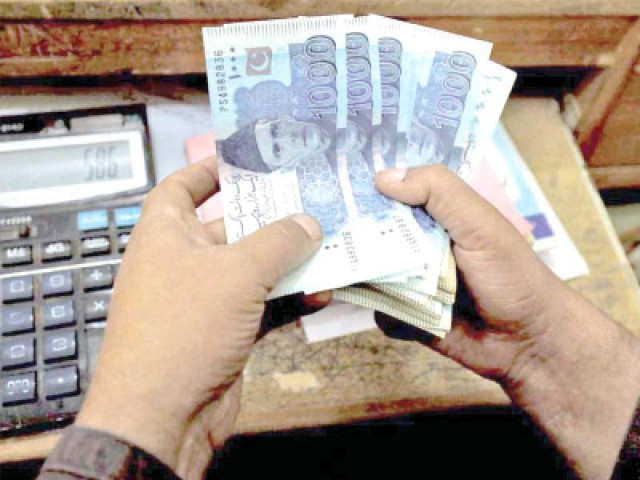Govt adds Rs397b to public debt
Central government debt increases to Rs35.5 trillion by end-October

The Pakistan Tehreek-e-Insaf-led (PTI) federal government added Rs397 billion more in public debt during first four months of current fiscal year, which is contrary to a claim made by Prime Minister Imran Khan and Finance Minister Dr Hafeez Shaikh.
The central government debt, which was Rs35.1 trillion in June this year, increased to Rs35.5 trillion by end-October, reported the State Bank of Pakistan (SBP). There was an increase of Rs397 billion or 1.2% in the debt stock, which was lower than the pace of increase recorded in the previous months.
Last month, Prime Minister Imran and Shaikh had claimed that the public debt remained unchanged at Rs36.4 trillion during July-October period of this fiscal year.
The Rs36.4 trillion was inclusive of the debt obtained from the International Monetary Fund (IMF) while the Rs35.5 trillion was exclusive of the IMF debt, as the Fund’s lending is booked at the balance sheet of the central bank but is shown as part of the public debt.
“During the July-October period of this fiscal year, the primary budget balance was in surplus and there was no need to acquire more debt. From June 30 to October 30, there was no increase in public debt, which remained unchanged at Rs36.4 trillion, which is a huge success,” Hafeez Shaikh had said while addressing a press conference along with the information minister a few days ago.
The public debt, Shaikh had said, did not increase because of increase in tax collection and revaluation of the external public debt after appreciation of rupee.
The external debt of the central government decreased from Rs11.8 trillion to Rs11.6 trillion by the end of October, a reduction of Rs255 billion or 2.1% in one year. The reduction was not that big, which could have absorbed the increase in the debt to finance the budget deficit.
In June this year, the rupee-dollar parity stood at Rs168.16 to a dollar, which improved to Rs160.38 a dollar by October, according to the central bank.
In his presser, Shaikh had not disclosed the overall budget balance number for the July-October period, whether it was in surplus or deficit.
The Express Tribune had reported this week that the federal budget deficit jumped to Rs894 billion or 2% of the size of national economy in first four months of the current fiscal year due to double-digit growth in expenditures.
Overall, the budget deficit, calculated after taking into account the provincial cash surplus, stood at Rs753 billion or 1.7% of GDP. It means, the federal government had to borrow this sum to finance the deficit.
The Rs35.5-trillion central government debt is exclusive of liabilities that the government indirectly owes to creditors. Thus, the gross public debt is far higher than the central government debt.
When Imran Khan became prime minister, the central government’s debt was close to Rs24.2 trillion and the last PML-N government added Rs5.65 billion a day into public debt, according to Dr Najeeb Khaqan, former spokesman of the finance ministry. On an average, per day addition in the public debt has jumped to Rs13.2 billion since the PTI came into power, according to Khaqan.
In February last year, the PM vowed to bring the public debt below Rs20 trillion.
The central government debt comprises long and short-term domestic and external debt. The SBP report showed that the central government’s total domestic debt increased from Rs23.3 trillion in June this year to Rs23.93 trillion by October, a net addition of Rs652 billion or 2.8%.
The report showed that a major increase in the federal government’s debt was on account of long-term debt, which swelled from Rs17.7 trillion to Rs18.9 trillion. There was an increase of Rs1.2 trillion or 6.8% in the long-term debt.
It was largely because of the government’s decision to convert its short-term borrowing from the central bank to long-term debt. This helped increase the maturity period of debt but also increased the cost of debt servicing.
The short-term domestic debt dropped from Rs5.6 trillion in June to Rs5 trillion by October this year due to the shift of borrowing to long-term instruments. There was a reduction of Rs549 billion or 9.8% in the short-term debt.
The federal government’s debt, acquired through the sale of Market Treasury Bills (MTBs) to commercial banks, decreased from Rs5.6 trillion to Rs5 trillion, a reduction of Rs543 billion.
Published in The Express Tribune, December 13th, 2020.
Like Business on Facebook, follow @TribuneBiz on Twitter to stay informed and join in the conversation.



















COMMENTS
Comments are moderated and generally will be posted if they are on-topic and not abusive.
For more information, please see our Comments FAQ